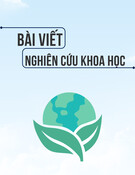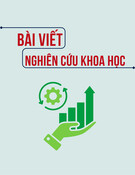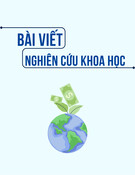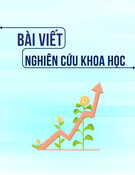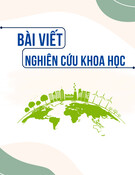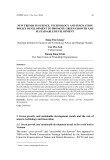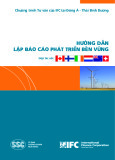
See discussions, stats, and author profiles for this publication at: https://www.researchgate.net/publication/384687072
From Concept to Practice: Innovations Driving Sustainable Economic
Development
Conference Paper · October 2024
CITATIONS
4
READS
101
1 author:
Junaid Sattar Butt
AJK Bar Council
47 PUBLICATIONS100 CITATIONS
SEE PROFILE
All content following this page was uploaded by Junaid Sattar Butt on 07 October 2024.
The user has requested enhancement of the downloaded file.

European Integration - Realities and Perspectives. Proceedings 2024
181
From Concept to Practice: Innovations Driving Sustainable Economic
Development
Junaid Sattar Butt
1
Abstract: The imperative for sustainable development has catalyzed a growing discourse on integrating green
economy principles into economic frameworks worldwide. The green economy, defined by low carbon
emissions, resource efficiency, and social inclusivity, is increasingly acknowledged as a crucial pathway to
achieving sustainable development goals. This abstract delves into the cutting-edge research and development
shaping the nexus of green economy and sustainable development, aiming to bridge the gap between theoretical
ideals and practical implementation. Sustainable economic development entails harmonizing economic growth
with environmental preservation and social equity, demanding innovative approaches that mitigate
environmental degradation while fostering inclusive prosperity. Current research emphasizes translating green
economy frameworks into actionable strategies and solutions, spotlighting key innovations driving sustainable
economic development across sectors. The abstract discusses advancements in renewable energy, such as next-
generation solar panels and advanced battery storage, facilitating a shift away from fossil fuels. It also explores
progress in circular economy practices, where waste becomes a resource, and biomimicry inspires sustainable
solutions. Emphasis is placed on social equity within the green economy, with insights into R&D in areas like
green jobs training and social impact investing ensuring an inclusive transition. Moreover, innovative policy
instruments like carbon pricing and green taxation are highlighted for incentivizing sustainable practices. The
abstract underscores the growing importance of multi-stakeholder partnerships among governments,
businesses, and civil society in driving systemic change. Key focus areas include renewable energy
technologies, sustainable agriculture practices, circular economy models, and green finance mechanisms.
Furthermore, the abstract underscores the significance of policy coherence, stakeholder collaboration, and
capacity building in facilitating the transition towards sustainable economic development. By examining recent
advancements and emerging trends, it underscores the pivotal role of innovation in fostering a more sustainable
and resilient global economy. By showcasing the latest advancements in green technologies, economic models,
and policy frameworks, this abstract underscores the transition from a theoretical concept to a practical reality,
envisioning a future where economic growth and environmental sustainability mutually reinforce each other.
Keywords: Green economy; Sustainable development; Economic growth; Environmental preservation;
Renewable energy; Circular economy; Biomimicry
1
Master of Laws (LL.M), Postgraduate Institute of Law, the University of Lahore, Advocate High Court, Member District Bar
Association Kotli, AJK Bar Council, Muzaffarabad, Pakistan Occupied Jammu & Kashmir, Pakistan, Tel.: +92 333 427 0989,
Corresponding Author: junaidsattarbutt@yahoo.com.
Copyright: © 2024 by the authors.
Open access publication under the terms and conditions of the
Creative Commons Attribution-NonCommercial (CC BY NC) license
(https://creativecommons.org/licenses/by-nc/4.0/)

ISSN: 2067 – 9211 Green Economy and Sustainable Development
182
1. Introduction
The pursuit of sustainable economic development is a defining challenge of our time. Technological
innovation can be seen from two main approaches: production-saving and resource-saving
(Akhtaruzzaman, Banerjee, Ghardallou & Umar, 2022) and to develop and use key innovations in green
and environmental technologies, education and training of the masses and labor force is a must (Umar,
Abrar, Zaremba, Teplova & Vo, 2022). Innovation is often considered a driving force behind sustainable
development, as it can enable economic growth while reducing negative impacts on the environment
and society (Chovancová, Majerník, Drábik & Štofková, 2024, pp. 245–252). Conceptual frameworks
abound, outlining strategies for achieving a future that balances economic prosperity with environmental
well-being and social equity. However, a persistent gap exists between these well-defined concepts and
their practical implementation. The influence of the environment in promoting innovation capacity is
one of the primary themes addressed by the environmental governance discourse (Hu, Sinha, Tan, Shah
& Abbas, 2022). In the realm of sustainable economic development, the journey from conceptualization
to practical implementation is often fraught with challenges and complexities. While there is an
abundance of theories, frameworks, and models that elucidate the concept of sustainability, translating
these ideas into actionable strategies that drive tangible economic development remains a formidable
task. However, it is precisely at this intersection between theory and practice where innovations emerge
as powerful catalysts for change. This paper delves into the dynamic landscape of sustainable economic
development, with a focus on the innovative approaches that bridge the gap between conceptualization
and practical application. By examining the evolving discourse surrounding sustainability and economic
growth, we seek to uncover the key drivers propelling the transition from abstract concepts to real-world
solutions. Through a synthesis of theoretical insights and empirical evidence, we aim to shed light on
the transformative potential of innovations in driving sustainable economic development. Drawing upon
diverse case studies and best practices from around the globe, we explore the mechanisms through which
innovative initiatives are reshaping traditional paradigms and fostering inclusive, resilient economies.
As we navigate the complexities of the contemporary socio-economic landscape, it becomes
increasingly evident that sustainable development is not merely a lofty ideal but an imperative for long-
term prosperity. By harnessing the power of innovation, we can unlock new pathways towards a future
where economic growth is harmonized with environmental stewardship and social equity. In this paper,
we invite readers to embark on a journey that traverses the conceptual realms of sustainability to the
practical realities of economic development. Together, let us explore the innovative strategies,
collaborations, and policies that hold the potential to drive meaningful change and propel us towards a
more sustainable and prosperous future.
2. Research Question
The research inquiry posed for the conference paper is:
RQ: How do innovative approaches bolster sustainable economic progress, and what variables
shape their effective execution from conception to real-world utilization?
This research query invites an examination into the interplay between innovation and sustainable
economic advancement, while also acknowledging the complexities and drivers in transforming
innovative ideas into practical solutions. It provides an avenue for exploring diverse facets of innovation,
including technological advancements, policy frameworks, and social initiatives, and their influence on
economic sustainability.

European Integration - Realities and Perspectives. Proceedings 2024
183
3. Literature Review
Li, X.; et. al.; (2024) (Li, Ma, Ruman, Iqbal & Strielkowski, 2024) unveils that natural resource mining
impedes sustainable development in China, confirming the “curse effect” of such resources. However,
it highlights that education and green innovation can mitigate this negative impact, particularly
benefiting western regions, thus shifting China’s economy towards innovation-driven growth.
Almawishir, N. F. S.; et. al.; (2024) (Almawishir & Benlaria, 2024) underscores the pivotal role of
Information and Communication Technologies (ICTs) in bridging innovation and sustainable
development within Saudi Arabian corporate settings. It also highlights the strong correlation between
innovation, social development, and ICT utilization, particularly in fostering communication patterns
essential for economic, environmental, and social sustainability. United Nations (2022)
1
reported that
innovation has been identified as a critical driver of sustainable development, as it can create new
products, services, and processes that are more environmentally friendly and socially responsible.
Manigandan, P.; et. al.; (2024) (Manigandan, et al., 2024) examines the influence of financial
development, environmental policies, green innovations, and natural resources on Sustainable Economic
Growth (SEG) in India, utilizing the innovative Fourier-ARDL approach and Fourier Toda-Yamamoto
causality test. Okoye, C. C.; et. al.; (2024) (Okoye, et al., 2024, pp. 292–302) offers a detailed
examination of sustainable supply chain practices, spotlighting innovative endeavors in the USA and
Africa. In the USA, emphasis lies on environmental responsibility and technological integration, while
in Africa, initiatives focus on local sourcing and community engagement, underscoring regional socio-
economic dynamics in shaping sustainable approaches. Yi, J.; et. al.; (2024) (Yi, Dai, Li & Cheng, 2024)
highlights that renewable energy innovation, pivotal in the fight against climate change, is significantly
impacted by the digital economy, stemming from the latest technological advancements. The digital
economy transforms the innovation landscape of renewable energy by reducing information disparities
and expediting information diffusion processes. Hussain, M.; et. al.; (2024) (Hussain, Yang, Maqsood
& Zahid, 2024) reveals that higher AIA correlates with increased green-ovation, particularly in
privately-owned enterprises, with financial analysts enhancing this link. Robustly validated through
various tests, the findings underscore AI’s potential to drive corporate eco-innovation, offering valuable
insights for leveraging digital technologies for sustainability in rapidly evolving economies like China.
Salihi, A. A.; et. al.; (2024) (Salihi, Ibrahim & Baharudin, 2024) delves into the drivers of green
innovation capacity and firm value creation, highlighting the pivotal role of environmental governance.
Findings reveal that companies recognizing the importance of environmental governance exhibit higher
tendencies for green innovation capacity, while emphasizing environmental dimensions enhances firm
value creation, particularly in Nigerian public listed firms. Butt, J. (2024) (Butt, 2024) investigates the
impact of AI on productivity and economic growth in Nordic welfare states, highlighting its potential to
enhance worker capabilities and drive innovation across sectors. It examines how AI adoption interacts
with the unique characteristics of these states, emphasizing the importance of social safety nets and up-
skilling initiatives for inclusive growth. Nuta, F. (2023) (Nuta, 2023, pp. 7–9) highlights the interplay
between economic, technological, and environmental factors in shaping human existence and the
imperative of responsible action for present and future generations amidst complex global crises. Further
studies Nuţă, F. M.; et. al.; (2023) (Nuţă, Balsalobre-Lorente, Shahbaz & Murshed, 2023) investigates
the Pollution Haven Hypothesis (PHH) in Eastern European emerging countries within the context of
globalization, aiming to address gaps in understanding the relationship between globalization, economic
complexity, and environmental concerns. Another study Dilanchiev, A.; et. al.; (2023) (Dilanchiev,
1
United Nations. (2022). World population prospects – population division. United Nations. Retrieved from
https://population.un.org/wpp/Publications/.

ISSN: 2067 – 9211 Green Economy and Sustainable Development
184
Nuţă, Khan & Khan, 2023) examines the relationship between urbanization, emissions, economic
growth, and renewable energy production in Black Sea Economic Cooperation member states, revealing
a significant long-term association and highlighting the pivotal role of renewable energy in combating
climate change in developing nations. Nuta, A. C.; et. al.; (2024) (Dilanchiev, Sharif, Ayad & Nuta,
2024, pp. 1-15) examines the impact of FDI, renewable energy, and remittances on environmental
quality in top remittance-receiving countries from 2000 to 2021, employing panel data analysis. Results
highlight a positive relationship between FDI and carbon emissions, while renewable energy and
remittances demonstrate an inverted U-shaped association with carbon emissions. Further research Nuta,
F.; et. al.; (2024) (Nuta, Nuta, Ahmed, Duan & Khan, 2024) explores strategies for enhancing the
resilience of emerging and developed economies in combating climate change risks. It underscores the
importance of financial stability, sustainability measures, and healthcare considerations in addressing
environmental challenges. The papers included in the topic examine various aspects, from assessing
healthcare costs influenced by climate change to evaluating the financial sustainability of oil and gas
firms and incorporating carbon tax policies into economic models to promote climate transition while
ensuring financial stability. The literature explores innovative approaches to sustainable economic
development across various regions and sectors. It highlights the impacts of natural resource mining in
China, the role of ICTs in Saudi Arabian corporate settings, financial development and environmental
policies in India, and sustainable supply chain practices in the USA and Africa. The study also explores
the integration of renewable energy innovation with the digital economy, AI’s potential in Nordic
welfare states, and the interplay between FDI, renewable energy, and environmental quality in top
remittance-receiving countries.
4. UN Sustainable Goals
The 2030 Agenda for Sustainable Development below, endorsed by all UN Member States in 2015,
serves as a comprehensive blueprint for promoting peace and prosperity across generations (Pang, Liu
& Hua, 2024, pp. 561–581). Its core comprises 17 Sustainable Development Goals (SDGs), urging
collective action from nations worldwide to address poverty, inequality, education, health, economic
growth, climate change, and environmental preservation. These goals build upon decades of
international efforts, including prior milestones like Agenda 21, the Millennium Development Goals,
and the Johannesburg Declaration. The endorsement process involved an Open Working Group and
extensive negotiations by the General Assembly. The year 2015 marked a significant moment in global
cooperation with the adoption of key agreements like the Paris Agreement. Presently, the High-level
Political Forum on Sustainable Development monitors SDG progress, while the Division for Sustainable
Development Goals supports implementation efforts within the UN system.

